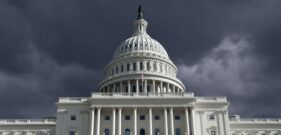Doesn’t Scalia’s originalism allow for just the kind of moral principle that Vermeule supports?
The Unconstitutionality of Prohibiting Faithless Electors
Recently, there has been a bit of an originalist debate about the issue of the “faithless elector.” David Post argues that “the original intent of the Constitution, supported by its text and overall structure, not only permits but also ‘requires’ presidential electors to exercise ‘discretion and independent judgment’ in casting their ballots. Mike Ramsey responds that the original meaning of the constitutional text – both the original Constitution and the 12th Amendment – allows the states to select electors “based on the electors’ advance pledge to vote for a particular candidate. There is no textual duty to exercise independent judgment.”
I tend to agree here with Mike and commend his post to all readers. The constitutional text, as Mike describes it, “says two relevant things: (a) ‘Each State shall appoint, in such Manner as the Legislature thereof may direct, a Number of Electors …’ and (b) ‘The electors shall meet in their respective states, and vote by ballot for President and Vice President…’” Although the text is not crystal clear, there does not appear to be a prohibition on the states deciding only to select electors who have pledged to vote for a particular candidate.
That said, I want to move on to a related issue that is not addressed in the Post/Ramsey exchange. Is it constitutional for a state to require that the elector actually vote for the pledged candidate? Many states have such laws. While one might extend Ramsey’s argument to cover this situation, I don’t think it can be extended that far. And therefore I tentatively conclude that the original meaning forbids such prohibitions.
What is the difference here? The Constitution allows the state to appoint “in such Manner as the Legislature thereof may direct” the electors. The key is drawing a distinction between appointing the electors and controlling the electors’ behavior once they have been selected. The Constitution appears to draw this distinction, allowing the states to appoint the electors, but not appearing to give the state any authority over how the electors vote, stating only that the electors shall meet in their states to cast their ballots.
A law that says that only electors who are pledged to a candidate may run for office appears to involve the appointment method of the electors. The pledge is a statement made prior to the selection of the electors and thus part of the appointment method. By contrast, a law that requires the electors to vote for the pledged candidate crosses the line and purports to regulate how the electors vote.
Here I believe the type of evidence that Post and others rely upon (such as Alexander Hamilton’s statement from the Federalist Papers) is relevant. That evidence supports my reading of the text. One might doubt my reading of the text if one believed that the purpose of the provision was to allow the states to necessarily control the electors’ votes. But that evidence suggests that was not necessarily the purpose, since it was certainly contemplated that independent judgment would occur.


